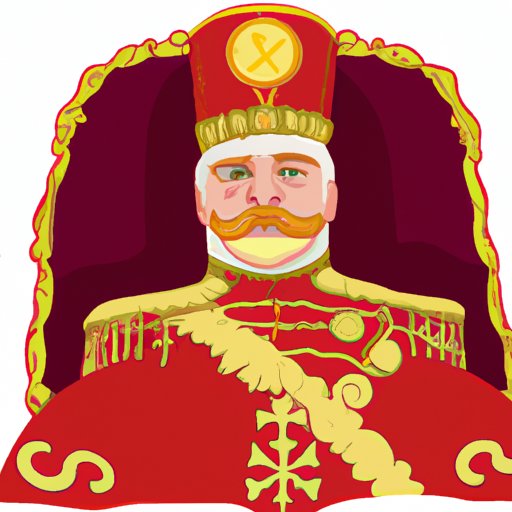Introduction
Throughout history there have been many leaders whose legacies are still debated today. One such leader is Czar Nicholas I of Russia. He is remembered for his long reign, which lasted from 1825-1855. In this article, we will explore the legacy of Czar Nicholas and evaluate whether or not he was a good leader. We will examine his autocratic approach to rule, his reliance on bureaucracy, and his lack of modern reforms. We will also assess the positive and negative aspects of his rule before offering a final assessment.
Examining the Legacy of Czar Nicholas: Was He a Good Leader?
Czar Nicholas I ascended to the throne in 1825 after the death of his brother, Alexander I. During his 30-year reign, he sought to restore the power of the monarchy and expand the Russian Empire. To achieve these goals, he implemented an autocratic style of rule, relying heavily on a powerful bureaucracy and strict censorship. He also resisted any attempts at reform, believing that modernizing Russia would weaken his authority. As a result, Czar Nicholas’s rule was marked by political repression, inadequate industrialization, and social unrest.
An Analysis of Czar Nicholas’s Leadership Style
Czar Nicholas I was an autocrat who sought to exert control over all aspects of Russian life. He maintained a tight grip on the press, censoring any content that could be perceived as critical of the government. He also placed restrictions on public gatherings and monitored the activities of universities and other institutions of higher learning. His autocratic approach extended to foreign policy as well, as he sought to expand the Russian Empire and maintain its dominance in Europe.
Czar Nicholas also relied heavily on bureaucracy to implement his policies. He established a powerful secret police force to monitor the population, and he created a series of ministries to oversee different aspects of government. He also required officials to submit regular reports to him, so that he could keep a close eye on their activities. This system of centralized bureaucracy enabled Czar Nicholas to maintain a high level of control over the country.
Finally, Czar Nicholas was strongly opposed to modern reforms. He believed that introducing new ideas and technologies would weaken his authority and undermine the traditional values of Russia. As a result, he refused to undertake any meaningful reforms during his reign, leading to a stagnation of progress in the country.
Assessing the Impact of Czar Nicholas on Russian History
When assessing the impact of Czar Nicholas on Russian history, it is important to consider both the positive and negative aspects of his rule. On the one hand, Czar Nicholas had some successes during his reign. He expanded the Russian Empire through successful military campaigns, and he promoted Russian culture by encouraging the production of literature and art. He also sought to strengthen the economy by promoting trade and industry.
On the other hand, Czar Nicholas’s rule was marked by political repression, inadequate industrialization, and social unrest. His autocratic approach led to widespread discontent among the population, and his refusal to introduce modern reforms resulted in a lack of economic development. Furthermore, his heavy reliance on bureaucracy created an inefficient and corrupt system of government.
Evaluating the Positive and Negative Aspects of Czar Nicholas’s Rule
When evaluating the positive and negative aspects of Czar Nicholas’s rule, it is important to consider the context of the time. On the positive side, Czar Nicholas achieved some notable successes during his reign. He successfully expanded the Russian Empire, won several military victories, and promoted Russian culture. These achievements should not be overlooked when assessing his legacy.
On the negative side, Czar Nicholas’s autocratic approach to rule led to political repression and social unrest. His unwillingness to accept change meant that he failed to introduce meaningful reforms, resulting in inadequate industrialization and poverty. Furthermore, his reliance on bureaucracy created an inefficient and corrupt system of government.

Exploring the Pros and Cons of Czar Nicholas as a Leader
When exploring the pros and cons of Czar Nicholas as a leader, it is important to consider his character. On the plus side, Czar Nicholas had a strong sense of duty and a high level of authority. He also had great diplomatic skills and was able to forge alliances with other European powers. Additionally, he was a highly educated man and was well-versed in the arts and sciences.
On the downside, Czar Nicholas was unwilling to accept change and lacked a vision for modernizing Russia. He was also unable to build alliances and was often viewed as an autocrat. Finally, his lack of social reform meant that he was unable to address the problems of poverty and inequality in the country.
Conclusion
In conclusion, Czar Nicholas I of Russia was a complex leader whose legacy is still debated today. On the one hand, he achieved some notable successes during his reign, such as expanding the Russian Empire and promoting Russian culture. On the other hand, his autocratic approach to rule led to political repression and social unrest, while his refusal to introduce modern reforms resulted in inadequate industrialization. Ultimately, it is up to the reader to decide if Czar Nicholas was a good leader.
(Note: Is this article not meeting your expectations? Do you have knowledge or insights to share? Unlock new opportunities and expand your reach by joining our authors team. Click Registration to join us and share your expertise with our readers.)
